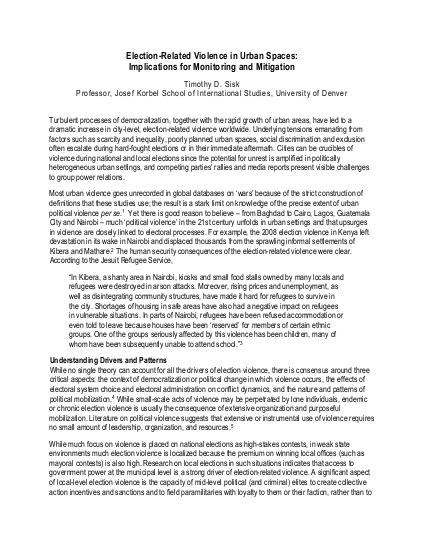
Turbulent processes of democratization, together with the rapid growth of urban areas, have led to a dramatic increase in city-level, election-related violence worldwide. Underlying tensions emanating from factors such as scarcity and inequality, poorly planned urban spaces, social discrimination and exclusion often escalate during hard-fought elections or in their immediate aftermath. Cities can be crucibles of violence during national and local elections since the potential for unrest is amplified in politically heterogeneous urban settings, and competing parties’ rallies and media reports present visible challenges to group power relations. Most urban violence goes unrecorded in global databases on ‘wars’ because of the strict construction of definitions that these studies use; the result is a stark limit on knowledge of the precise extent of urban political violence per se. Yet there is good reason to believe – from Baghdad to Cairo, Lagos, Guatemala City and Nairobi – much ‘political violence’ in the 21st century unfolds in urban settings and that upsurges in violence are closely linked to electoral processes. For example, the 2008 election violence in Kenya left devastation in its wake in Nairobi and displaced thousands from the sprawling informal settlements of Kibera and Mathare. The human security consequences of the election-related violence were clear.
Resource collections
- Evaluating humanitarian action
- Monitoring and Evaluation (M&E)
- Monitoring of humanitarian action
- UN Habitat - Urban Response Collection
- Urban Response - Urban Crisis Preparedness and Risk Reduction
- Urban Response Collection - Community Engagement and Social Cohesion
- Urban Response Collection - Economic Recovery
- Urban Response Collection - Environment and Climate Change
- Urban Response Collection - Housing, Land and Property
- Urban Response Collection - Urban Crisis Response, Recovery and Reconstruction
- Urban Response Collection - Urban Resilience
- Use of evaluation evidence